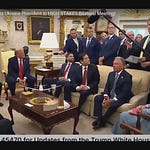We sit down with Italian journalist Thomas Fazi, whose latest study delivers a bombshell conclusion: Europe’s only path forward lies in tearing down the European Union as it stands. Far from being the guarantor of Europe’s future, Brussels, he argues, has become the cage that prevents the continent from having one.
Supranationalism—the European brand of globalist delusion—has run its course and failed spectacularly. The grand experiment that began with the euro, once hailed as the key to unity, has instead driven Europe’s economies apart. The single market, sold as a booster of continental trade, has presided over its steady decline. So much for integration. What we’re left with is not an economic miracle, but the predictable wreckage of globalization’s false promises.
Fazi’s diagnosis cuts deeper: the European Union was designed, from the start, to put economic decision-making beyond the reach of voters—and therefore beyond democracy itself. “Europe” was never about peace and prosperity; it was about control. Today, with the EU and NATO practically fused into one geopolitical apparatus, even the illusion of prosperity has evaporated. The result? A continent unmoored, obedient, and poorer for it.
Europe’s political elites have never looked so relieved. By surrendering their duty to govern, they’ve discovered the perfect alibi: supranationalism. It lets them smuggle their preferred policies through Brussels while feigning outrage about them back home. Cowardice has never been so efficiently institutionalized.
As for the parties promising to “reform” the European Union from within—they’re either deluding themselves or lying outright. The house is burning, and they’re still rearranging the drapes.
The evidence is undeniable. The supranational creed—now embodied in the quiet fusion of the EU and NATO—has become Europe’s suicide note. It is dragging the continent toward irrelevance, ejecting it from the current of history. A truly multipolar world cannot be built on a foundation of vassal states, but only on sovereign nations choosing their partnerships freely and on their own terms.













